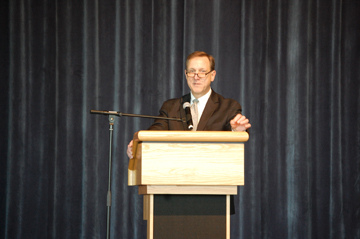Forum provides local and state economic outlook
Published 5:42 pm Wednesday, January 11, 2017

- County Judge Jeff Branick spoke on money matters at the Economic Outlook Forum on Wednesday morning at the Beaumont Event Centre.
BEAUMONT — In addition to making resolutions a new year also offers the opportunity to plan ahead.
That’s what was happening at the Economic Outlook Forum on Wednesday morning at the Beaumont Event Centre. The event was sponsored by the Regional Economic Development Initiative and presented by Mobiloil Credit Union.
Steve Minick, vice president for governmental affairs for the Texas Association of Business, was the keynote speaker.
Trending
Minick grew up in Beaumont. He now lives in the Austin area.
He said Southeast Texas has grown since the recent recession and oil and gas prices are starting to turn around.
He foresees the incoming Trump administration as an opportunity to make changes that will be beneficial on an economic basis. He cautioned, however, the administration should be careful how much and how many things they want to change from the Obama administration and focus on the things that can be done.
“He needs to pick the low hanging fruit,” Minick said. “It could be detrimental to businesses to make immediate change. He can’t wipe it out overnight. We need regulation reform, but more effective and meaningful regulations.”
On the environmental side of things, he believes businesses need real science about the ozone. The air is much cleaner now than many are led to believe.
Tens of millions of people are counted in unemployment figures since many have dropped out of the workforce and have up looking for a job.
Trending
“We have enormous potential for increasing employment in Texas,” he said.
Joe Straus, Speaker of the Texas House of Representatives, was reelected as speaker this session 150-0 in a show of support for how the process works.
The Legislature started off with a $10 billion surplus last session. This year, however, it is estimated they will start $5 billion in the hole over the next biennium due to a downturn in oil and gas prices. He added that the $5 billion deficit may had been caused by the TAB when they requested funds be redirected last session to meet transportation needs for the state.
New money will have to be found to make up the deficit. Minick expects every agency will have to cut back.
“The most egregious thing government can do is take money out of my pocket, put it in the treasury, and not spend it,” he said. “It’s absurd not to spend that money. We need a good return of investment on our money.”
Another department that needs attention is the state’s Child Protective Services which will probably require $150 million to straighten things out.
“The need is very critical,” he said.
Another area is the inflated cost of Medicaid.
There’s a move afoot in the Legislature to cut residential property taxes, but that would shift the burden to Texas businesses who already pay 63 percent of property taxes.
Minick then switched his attention to Southeast Texas.
He urged a focus on infrastructure and not just roadways and waterways, but on an educated workforce and businesses being successful.
“The state spending money is not always a bad thing when we focus on return on investment,” he said about economic development. “I encourage you to communicate this with local legislators.”
He concluded his speech by saying nothing is wrong about sending students into the technical trades.
“We have a critical need for an educated workforce,” Minick said.
Jeff Branick, Jefferson County Judge, spoke next.
He said he’s optimistic about the local economy because sales tax revenues have remained strong the last two years.
New projects are coming online and Motiva, Total and Valero refineries as well as 32 chemical plants have undergone expansions.
Branick said there’s been a lull in oil and gas activity because the Obama administration’s regulatory agencies were not friendly to fossil fuels and it was a long road for permitting jobs.
For instance, Golden Pass LNG spent $350 million in permitting for their construction though the technology “is tried and true.”
“The regulatory environment is extremely over burdensome,” he said.
Sempra Energy at Sabine Pass is being constructed and Exxon-Mobil Refinery is expanding.
Branick said Lamar University is a world-class university that has made great strides under former President Jimmy Simmons and current President Kenneth Evans.
Jefferson County is still an attractive place to do business because the county has the ninth lowest tax rate of the 254 counties in Texas.
“The leadership here is appreciative of our businesses,” he said. “We have great infrastructure here with our railroads, highways and waterways.”
Projects such as the Interstate 10 overpass near Ford Park have started ahead of schedule.
The federal government has authorized the deepening of the Sabine-Neches Ship Channel; the county is just waiting for the money to be appropriated.
The deepening would accommodate the larger Panamax vessels.
Representatives from Korea, Japan and China have met with Branick about potential projects because the Panama Canal has been upgraded.
He added that he always seeking opportunities to diversify the economy. The county owns some land and he offers free land for companies to come here who qualify.
Branick said he does have some concerns about the economy, however.
“Supply and demand has hit us,” he said speaking of the oil and gas industry. “We’re a microcosm of the state. We have reduced revenues of $11.7 million. Fortunately we boost the general fund to weather any storm.”
“We’re in a deficit budget now until oil recovers.”
There are many out of state license plates in parking lots for some of these large projects, Branick said. He said companies would like to hire locally, though.
He added Southeast Texas counties are responsible for more jobs than anywhere else in the nation.
Jefferson County has one of the highest single parent household rate in Texas of counties of comparable size. Branick said studies have shown children raised in that environment have less economic success, less educational attainment, more chemical dependency and brushes with the law.
He said solving that would require a conversation at the federal and state level about entitlement reform.
David Ball: 409-721-24





